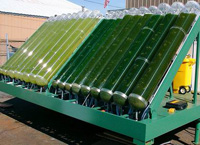Ethanol from Algae
New biotechnologies are being researched in order to find ways to use the rapid growth of algae to produce ethanol directly.

Algae can produce more oil than similar areas devoted to more typical plants such as corn or rapeseed. It can also be grown on land that is unsuitable for most crops, because it can grow in deserts, saline environments, and other marginal lands.

In some cases, it is possible to grow algae in smoke stacks. The algae benefits from the excess carbon dioxide emitted from fossil fuel burning and the algae removes some of the carbon dioxide from the exhaust gases.

Environmental Cost
The use of carbon dioxide for algal growth makes algae a fuel source with no carbon footprint. Growing algae removes carbon dioxide from the atmosphere. While, burning algae fuel emits carbon dioxide. The whole process is balanced and considered carbon neutral.
The use of carbon dioxide for algal growth makes algae a fuel source with no carbon footprint. Growing algae removes carbon dioxide from the atmosphere. While, burning algae fuel emits carbon dioxide. The whole process is balanced and considered carbon neutral.
